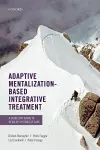
Adaptive Mentalization-Based Integrative Treatment
4 authors - Paperback
£31.49
Dickon Bevington is a Consultant in Child and Adolescent Psychiatry in the NHS in Cambridgeshire, and is Medical Director at the Anna Freud National Centre for Children and Families. He specialises in the outreach treatment of complex, risky and hard to reach young people with substance use disorders and has previously worked in Adolescent inpatient hospitals. He has led the development of online wikis as treatment manuals, and previous publications include co-authorship of "What Works for Whom? A critical review of treatments for children and adolescents" (Fonagy et al, Guilford, 2014). Peter Fuggle is a clinical psychologist and currently Clinical Director of the Anna Freud National Centre for Children and Families. He previously worked for over 30 years in the UK National Health Service integrating mental health services for children and young people into schools and social care. He has a long standing interest in working on projects for young people and families who do not seek help for their mental health needs and the AMBIT collaboration arose directly out of this interest. Liz Cracknell is Programme Lead for AMBIT at the Anna Freud National Centre for Children and Families. As a Mental Health Nurse and Systemic Practitioner, she leads an integrated NHS health team that in-reaches to a Secure Children's Home. In her clinical role, Liz has specialised in work with young people with complex, risky problems, utilising the AMBIT approach. She has contributed to a number of key publications and the development of AMBIT and has trained and consulted with hundreds of workers in AMBIT in the UK and internationally. Peter Fonagy, OBE FMedSci FBA FAcSS PhD is Professor of Contemporary Psychoanalysis and Developmental Science, and Head of the Division of Psychology and Language Sciences at UCL, and Chief Executive of the Anna Freud National Centre for Children and Families. His clinical and research interests centre on issues of early attachment relationships, social cognition, borderline personality disorder, and violence. A major focus of his work has been the development of mentalization-based treatment, an innovative research-based psychodynamic therapeutic approach, in collaboration with colleagues in the UK and USA. He has published over 450 scientific papers and 250 chapters, and has authored or co-authored 19 books.